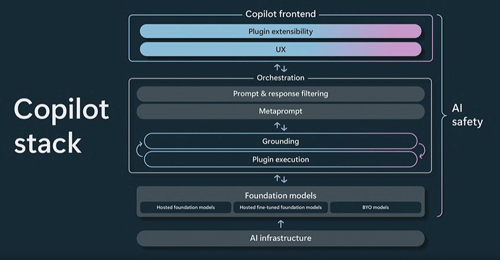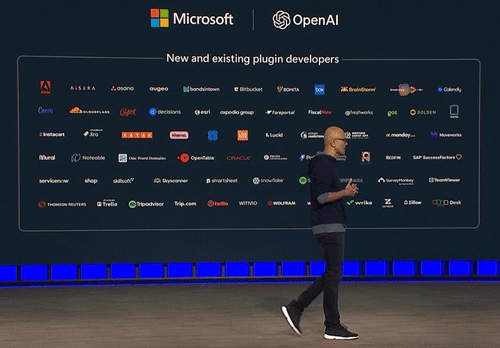News
Build 2023: AI in Windows 11, Data Fabric Debuts and Copilot Becomes a 'Stack'
Microsoft's Copilot universe is expanding.
Microsoft announced two more areas getting the AI treatment at its Build developer conference this week: Windows and its data analytics portfolio.
Windows 11 will be the first PC to include Windows Copilot, according to Microsoft CEO Satya Nadella during his opening keynote. Copilot, of course, is the umbrella name for Microsoft's various ChatGPT-powered integrations. As mentioned, there's a Microsoft 365 Copilot, a Security Copilot, a Copilot for Viva, a Copilot for Dynamics and one for GitHub.
Windows Copilot, as reported by Redmond's Chris Paoli, "brings centralized AI assistance to users through a button on the [Windows] taskbar." Expected to reach the preview stage next month, Windows Copilot will "allow users to ask questions...and perform complex actions, such as summarizing content or rewriting e-mail."
As Nadella put it during the keynote, it will "make every Windows user a power user."
The second area receiving more AI capabilities is Microsoft's existing data platform. Introduced by Nadella at Build as "data analytics for the era of AI," the new Microsoft Fabric product recontextualizes Microsoft's data analytics tools like Power BI, Azure Synapse Analytics and Azure Data Factory as a single SaaS product offering. As Microsoft SQL Server MVP and Redmond columnist Joey D'Antoni writes, "Microsoft built Fabric around the data fabric concept -- a new wave in data analytics that blends many modern trends like data lakes, the delta store and parquet file formats, presented behind a standard set of APIs."
Nadella touted Microsoft Fabric as the biggest data product launch for Microsoft since SQL Server.
Copilot Stack and Plugins
There are Copilots aplenty at Microsoft right now, but Microsoft took it a step further at Build. "Copilot" is not just a label for one-shot AI products; it's also now a full stack.
 The Copilot Stack as described by Microsoft's Kevin Scott at Build, May 23.
The Copilot Stack as described by Microsoft's Kevin Scott at Build, May 23.
Microsoft CTO Kevin Scott took the keynote stage after Nadella to talk about current AI product development at Microsoft, which largely revolves around Copilot. As part of his presentation, he described the newly announced "Copilot stack," which is effectively an end-to-end series of handholds to help developers create extensible plugins.
"This stack includes support for plugins that augment the capabilities of AI systems by allowing them to retrieve real-time information, incorporate company or other business data, perform new types of computations and safely take action on the user's behalf," Microsoft said in a post Tuesday.
Plugins are a critical piece of Microsoft's Copilot era, with Scott calling them "the actuators of the digital world" during the keynote. As VisualStudioMagazine's David Ramel explains:
Plugins allow Microsoft's copilots to interact with a range of different software and services, enabling developers to build plugins that retrieve real-time information, incorporate company or other business data, and take action on a user's behalf. With a plugin, an AI system can access private files, enabling it to answer a question about business-specific data. This feature is seen as a response to the increasing demand for privacy in the context of generative AI, which could potentially leak sensitive data.
Ramel continues:
Today [at Build], Microsoft announced it was working with OpenAI to support and grow the AI plugins ecosystem by embracing an open standard for plugins that integrates across OpenAI's ChatGPT and Microsoft's copilot offerings, which include Bing Chat, Dynamics 365 Copilot, Windows Copilot and Microsoft 365 Copilot.
 Microsoft CEO Satya Nadella presenting the list of available plugins at Build, May 23.
Microsoft CEO Satya Nadella presenting the list of available plugins at Build, May 23.
There are currently more than 50 plugins available, with thousands more rolling out in the next few months. Ultimately, Microsoft's goal is to expand the universe of copilots via plugins, leveraging its vast developer and partner base, as well as the extensive compute and processing power of its Azure cloud. During the keynote, in fact, Microsoft cloud and AI chief Scott Guthrie called Azure the "world's AI supercomputer," and noted that the rapid pace of Copilot releases at Microsoft was only possible because the company built everything on Azure AI.